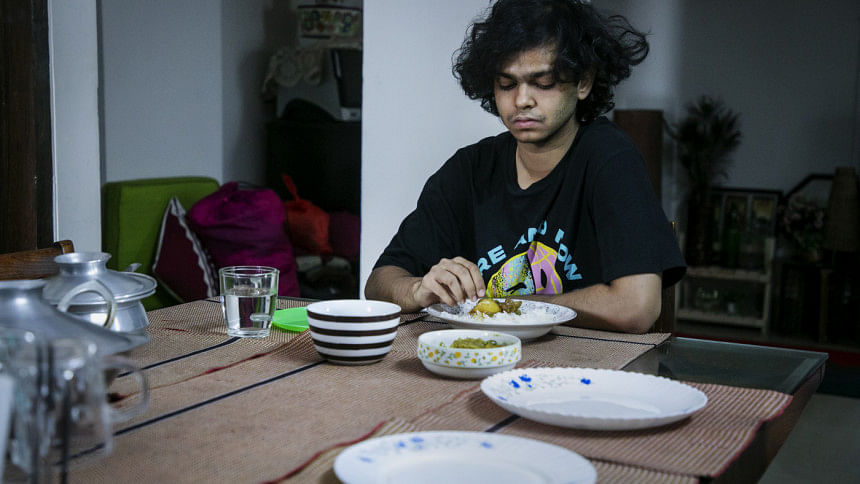How children are affected by their parents' unhappy marriage

In a study conducted in 2018, it was found that one divorce is filed every hour in Bangladesh. While the statistic might sound alarmingly high, it is, in fact, quite low compared to the number of couples who remain in unhappy marriages.
There is no denying that an overwhelming stigma around divorces still exists in our society. Not only are divorcees subjected to endless mockery and malicious comments behind their backs, society often tends to label them as failures. This disapproval and social stigma lead most couples to stay in their unhappy relationships. However, many people also choose to continue their marriage only because they mistakenly believe it is better for their children if they do so.
Marital conflict can result in constant fighting and can breed a hostile atmosphere in a household. An environment like this strips away the sense of safety and security that is necessary for a child to have a healthy and nurturing childhood.
Fatema Khatun, 19, shares her own experience saying, "The never-ending anxiety of not knowing when or how another fight might break out ate away at me. I simply wanted them to stop being with each other."
When a marriage deteriorates to the point where there is endless fighting and separation appears to be the obvious solution to end the suffering of both parties involved, it can have serious consequences on the mental health of their children.
Porom Chowdhury*, 17, grew up watching his parents tearing away at each other with their words. He says, "Without proper reference to what a healthy relationship looks like, my parents' relationship seemed normal to me. It was easy to convince myself as a kid that it was just something they did. I got desensitised to them fighting to a point that even when something serious happened, I shrugged it off. It took me a long time to grow out of it."
It can even affect their ability to form meaningful connections in the future, lead them to have trust issues and lose faith in marriage as a concept.
Aranyo Rishi, 18, states that, "My parents used to be physically violent. The fights that broke out, or even just the general attitude between our parents took a toll on my sister and me. We developed an irrational and deeply distorted view of marriage. Even if I acknowledge that it's an unreasonable view grounded in trauma and tainted objectivity, there's a subconscious part of me that can't help but insist I never get married."
Children, especially those that are very young, are incredibly intuitive and can easily pick up on cues. Even if their parents are trying to hide their unhappiness, they can detect it. This can, in turn, lead them to formulate their own reasons which sometimes involve blaming themselves. Not only can this make them feel responsible for their parents' sadness, but can even serve as a precursor to them developing self-esteem issues.
Moreover, conflict does not only occur in the form of fighting. Sometimes, one partner might be more demanding and in order to avoid discord, their other half is forced to make adjustments despite their own wishes.
Leyana Hasan*, 19, elaborates, "My mother always makes sure to do things exactly as my father wants. She even goes so far as to defend him when he's horrible to me and my brother, all in the hopes that he won't start shouting. But seeing her struggling like this only makes me grow contemptuous towards my father."
This feeling of reproach towards a parent or both parents can also stem from a general decline in the quality of relationship between parents and their children. As the parents' frustration and pain builds up, they can become overwhelmed by their own emotions. Consequently, the parents' dissatisfaction can manifest in the form of neglect or anger, which may result in the parents lashing out at their children over entirely unrelated reasons.
The idea that staying together as a complete family unit is beneficial for the children is erroneous. From certain perspectives, it can be understood how someone might be misled to make this judgement. There is, after all, research that shows that children growing up with divorced parents tend to fare worse than those that grow up with parents married to each other.
What people don't acknowledge is that this happens when the couple is satisfied in their relationship. There also exists evidence to suggest that growing up in a house full of conflict can do more harm to a child than a divorce. Furthermore, in many households, physical, verbal, or emotional abuse is present. Exposure to this, whether it is directed from one parent to the other or towards the children, is infinitely more destructive than exposure to divorce.
When asked about the impact of conflict ridden families on children, Mithila Khandaker, consultant psychologist at LifeSpring, says, "A child learns about the world, about the meanings of words such as love, respect, affection, and marriage through their parents. Thus, when they see their parents disrespecting each other, the meanings of these words become blurred for them. It disturbs them deeply, to see these concepts taking such hideous forms and the dilemma it puts them through is quite harmful. Study shows that a marriage of conflict can be detrimental to the brain development of a child."
She continues, "Every parent wishes for their child's mental well-being. Hence, they don't want to put their child through divorce. But while a divorced family might not be considered normal, the child can at least be free of the daily trauma of seeing their parents fighting. The struggle of surviving the divorce is considerably less."
There are also instances where people stay together not because of their children, but instead use the children as weapons to stay together. Not being able to rid themselves of the terror of what might happen if they get divorced, they hold the children as a sort of collateral, wielding them against their partner in order to force them to stay in the unhappy marriage.
Anindya Arif, 20, shares a similar view, "Children are seen as a guarantee that the other person won't leave them. Thus, our parents are ultimately doomed to repeat the same toxic cycle their parents made."
Perhaps the best way that children feel about their parents remaining in unhappy marriages because of them can be summed up by what Rishi shared with us, "There's a certain unbearable pain in watching two people close to you, who used to be close to each other, purposefully hurt themselves deeply, because of you."
*Names have been changed upon request.
References:
1. The Daily Star (September 03, 2018). Nahela Nowshin: 'Understanding the rise in divorce in Bangladesh
2. Healthline (May 07, 2020). 10 Effects of Divorce on Children — and Helping Them Cope
3. PNAS (February 14, 2019). Jennie E. Brand, Ravaris Moore and Yu Xie: Parental divorce is not uniformly disruptive to children's educational attainment
Zaima is a fake poet with a serious problem against anything that resembles seriousness. Send her your sympathies at [email protected].

 For all latest news, follow The Daily Star's Google News channel.
For all latest news, follow The Daily Star's Google News channel. 









Comments